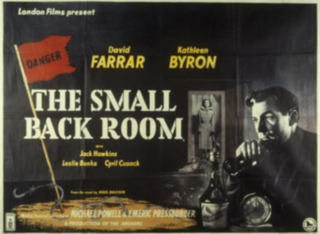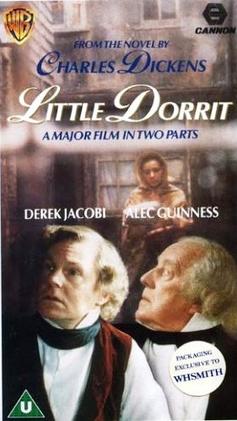Related Research Articles

The oldest known surviving film was shot in the United Kingdom as well as early colour films. While film production reached an all-time high in 1936, the "golden age" of British cinema is usually thought to have occurred in the 1940s, during which the directors David Lean, Michael Powell, and Carol Reed produced their most critically acclaimed works. Many British actors have accrued critical success and worldwide recognition, such as Audrey Hepburn, Olivia de Havilland, Vivien Leigh, Glynis Johns, Maggie Smith, Laurence Olivier, Michael Caine, Sean Connery, Ian Mckellen, Joan Collins, Judi Dench, Julie Andrews, Daniel Day-Lewis, Gary Oldman, Emma Thompson, Anthony Hopkins and Kate Winslet. Some of the films with the largest ever box office returns have been made in the United Kingdom, including the fourth and fifth highest-grossing film franchises.

A hero is a real person or a main fictional character who, in the face of danger, combats adversity through feats of ingenuity, courage, or strength. The original hero type of classical epics did such things for the sake of glory and honor. Post-classical and modern heroes, on the other hand, perform great deeds or selfless acts for the common good instead of the classical goal of wealth, pride, and fame. The antonym of hero is villain. Other terms associated with the concept of hero may include good guy or white hat.
The Old Testament (OT) is the first division of the Christian biblical canon, which is based primarily upon the 24 books of the Hebrew Bible, or Tanakh, a collection of ancient religious Hebrew and occasionally Aramaic writings by the Israelites. The second division of Christian Bibles is the New Testament, written in Koine Greek.

Inanna is the ancient Mesopotamian goddess of love, war, and fertility. She is also associated with sensuality, procreation, divine law, and political power. Originally worshiped in Sumer, she was known by the Akkadian Empire, Babylonians, and Assyrians as Ishtar. Her primary title was "the Queen of Heaven".

Stephen and Timothy Quay are American identical twin brothers and stop-motion animators who are better known as the Brothers Quay or Quay Brothers. They received the 1998 Drama Desk Award for Outstanding Set Design for their work on the play The Chairs.

Jiminy Cricket is the Disney version of the "Talking Cricket", a fictional character created by Italian writer Carlo Collodi for his 1883 children's book The Adventures of Pinocchio, which Walt Disney adapted into the animated film Pinocchio in 1940. Originally an unnamed, minor character in Collodi's novel who is killed by Pinocchio before returning as a ghost, he was transformed for the Disney adaptation into a comical and wisecracking partner who accompanies Pinocchio on his adventures, having been appointed by the Blue Fairy to serve as Pinocchio's official conscience. In the film, he sings "When You Wish Upon a Star", the Walt Disney Company's signature song, and "Give a Little Whistle".
Fictitious or fake entries are deliberately incorrect entries in reference works such as dictionaries, encyclopedias, maps, and directories, added by the editors as copyright traps to reveal subsequent plagiarism or copyright infringement. There are more specific terms for particular kinds of fictitious entry, such as Mountweazel, trap street, paper town, phantom settlement, and nihilartikel.

A baler or hay baler is a piece of farm machinery used to compress a cut and raked crop into compact bales that are easy to handle, transport, and store. Often, bales are configured to dry and preserve some intrinsic value of the plants bundled. Different types of balers are commonly used, each producing a different type of bale – rectangular or cylindrical, of various sizes, bound with twine, strapping, netting, or wire.

Enkidu (Sumerian: 𒂗𒆠𒄭EN.KI.DU10) was a legendary figure in ancient Mesopotamian mythology, wartime comrade and friend of Gilgamesh, king of Uruk. Their exploits were composed in Sumerian poems and in the Akkadian Epic of Gilgamesh, written during the 2nd millennium BC. He is the oldest literary representation of the wild man, a recurrent motif in artistic representations in Mesopotamia and in Ancient Near East literature. The apparition of Enkidu as a primitive man seems to be a potential parallel of the Old Babylonian version (1300–1000 BC), in which he was depicted as a servant-warrior in the Sumerian poems.

The Small Back Room is a 1949 film by the British producer-writer-director team of Michael Powell and Emeric Pressburger starring David Farrar and Kathleen Byron and featuring Jack Hawkins and Cyril Cusack. It was based on the 1943 novel of the same name by Nigel Balchin.
Gilgamesh is a Japanese manga series written and illustrated by Shotaro Ishinomori. It was serialized in the Shōnen Gahōsha magazine Weekly Shōnen King from 1976 to 1978. In 2003, an anime series based on the original story was produced by Ishimori Entertainment and animated by Group TAC and Japan Vistec. Gilgamesh is set in the near future and the plot revolves around characters who can be divided into four groups: The Countess and the Orga-Superior, the Mitleid Corporation, the siblings, and the Gilgamesh. With the development of the plot, the past and motives of the characters and their relationships with one another are exposed.

Little Dorrit is a 1987 film adaptation of the 1857 novel Little Dorrit by Charles Dickens. It was written and directed by Christine Edzard, and produced by John Brabourne and Richard B. Goodwin. The music by Giuseppe Verdi was arranged by Michael Sanvoisin.
Michael Joseph Anderson was an English film and television director. His career spanned nearly 50 years across three countries, working at various times in the United Kingdom, the United States, and Canada. His most critically and commercially successful works include the World War II film The Dam Busters (1955), the dystopian sci-fi film Logan's Run (1976), and the comedy adventure epic Around the World in 80 Days (1956), which won the 1957 Academy Award for Best Picture.

Thomas George Bell was an English actor on stage, film and television. He often played "menacing or seedy roles, perhaps most memorably playing sexist Detective Sergeant Bill Otley, antagonist to Helen Mirren's DCI Jane Tennison in Prime Suspect.
Robert Morton Fass was an American radio personality and pioneer of free-form radio, who broadcast in the New York region for over 50 years. Fass's program, Radio Unnameable, aired in some form from 1963 until his death primarily on WBAI, a radio station operating out of New York City.

The Epic of Gilgamesh has directly inspired many manifestations of literature, art, music, and popular culture throughout history. It was extremely influential during the Bronze Age and Iron Age in the Middle East, but gradually fell into obscurity during classical antiquity. The story was rediscovered in the 19th century, and began to regain popular recognition and influence in the 20th century.

P2 is a 2007 American psychological horror film directed by Franck Khalfoun, in his directorial debut, co-written by Khalfoun and producers Alexandre Aja and Grégory Levasseur, and starring Rachel Nichols and Wes Bentley. Its plot follows a young businesswoman who becomes trapped in an underground parking garage in midtown Manhattan on Christmas Eve, where she is pursued by a psychopathic security guard who is obsessed with her.
Epic is a narrative genre characterised by its length, scope, and subject matter. The defining characteristics of the genre are mostly derived from its roots in ancient epics. An epic is not limited to the traditional medium of oral poetry, but has expanded to include modern mediums including film, theater, television shows, novels, and video games.

Grotesque is a 2009 Japanese exploitation horror film written and directed by Kōji Shiraishi.
The Epic of Gilgamesh is an epic poem from ancient Mesopotamia.
References
- ↑ "BFI Screenonline: This Unnameable Little Broom (1985)".
- ↑ "BFI Screenonline: This Unnameable Little Broom (1985)".
- ↑ "Quay, Stephen and Timothy – Senses of Cinema". 17 December 2013.
- ↑ The Epic of Gilgamesh, Translated by Maureen Gallery Kovacs, Electronic Edition by Wolf Carnahan, I998, Ancient Texts.org
- ↑ This Unnameable Little Broom (1985), British Film Institute's Screen Online website
- ↑ The Epic of Gilgamesh - The Quay Brothers Archived 26 October 2009 at the Wayback Machine , Zeitgeist Films website
